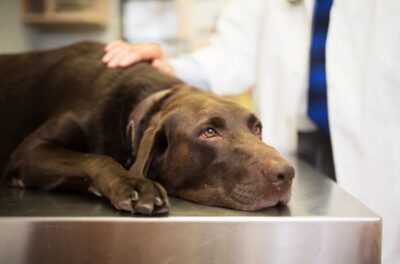Can Dogs Get Colds?

Overview
- Colds in dogs are very common worldwide and most carry mild symptoms.
- The symptoms of colds in dogs are similar to those seen in humans.
- Vets typically diagnose based on their symptoms and a history of exposure to other dogs.
- Vaccinations are one of the best ways that pet parents can prevent or reduce the severity of dog colds.
Catching colds is an all-too-frequent occurrence for us humans. According to the Centers for Disease Control, adults get two to three colds yearly and children catch colds even more often.
Most people wouldn’t wish the uncomfortable runny noses, headaches, sore throats, coughing, and sneezing that accompany the common cold on their worst enemy. But what about our furry best friends? Can dogs get colds, too?
Yes, they do. This article will explain what causes dog colds, symptoms to watch out for, home remedies that can help, how vets diagnose and treat colds in dogs, and what pet parents can do to prevent them.
Can Dogs Get Colds?

In humans, the common cold refers to a generally mild viral respiratory illness that can be caused by a variety of different respiratory viruses, most commonly rhinoviruses. Dogs also get respiratory illnesses and often suffer many of the same cold symptoms as people do. But, in dogs, this condition is referred to as canine infectious respiratory disease complex (CIRDC) or, more commonly, “kennel cough.” For this article, we will refer to CIRDC as dog colds, since the disease complex is very similar to colds in humans.
Colds in dogs are very common worldwide, especially in dogs that are housed with or spend lots of time around other dogs. Most canine colds carry mild symptoms that typically resolve on their own, without the need for medical treatment.
What Causes Colds in Dogs?

Dog colds can be caused by infections with one or more viruses or bacteria. Viral causes of colds in dogs include canine adenovirus-2, canine herpesvirus-1, canine parainfluenza virus, canine respiratory coronavirus (not the same as COVID-19), canine influenza virus, and canine distemper virus. The most common bacterial causes of dog colds include Bordetella bronchiseptica, Mycoplasma cynos, and Streptococcus equi subspecies zooepidemicus.
As in humans, dog colds are very contagious. Colds mostly spread through aerosolized droplets when an infected dog coughs or sneezes. They can also spread via contact with contaminated surfaces.
Colds affect dogs of all ages and breeds, with no breed or breeds thought to be more prone than others to developing colds. Colds are likely to cause more severe symptoms in very young dogs, very old dogs, and dogs with disorders that suppress their immune systems.
The good news is that you’re not likely to catch your dog’s cold, and vice versa. Currently, none of the common dog or human cold viruses or bacteria are thought to be contagious across the species.
Dog Cold Symptoms

The symptoms of colds in dogs are similar to those seen in humans. Most symptoms are mild and respiratory in nature.
The most common symptoms of colds in dogs include:
- Dry cough
- Sneezing
- Clear eye discharge
- Runny nose
These symptoms are also seen with allergic rhinitis, or allergies affecting the respiratory system. So if your dog’s symptoms occur frequently or seasonally, be sure to ask your veterinarian whether allergies could be the culprit, rather than a cold.
More severe cold symptoms include:
- Fever
- Lethargy
- Decreased appetite
Diagnosing Colds in Dogs

Veterinarians typically diagnose colds in dogs based on their symptoms and a history of recent exposure to other dogs. The most common places a dog may catch a cold include boarding and daycare facilities, dog parks, and veterinary clinics. Less commonly, a dog may catch a cold from indirect contact with an infected dog via a water or food bowl.
If your dog has more severe symptoms of a cold or a cold lasting longer than 1-2 weeks, blood work, X-rays, and polymerase chain reaction (PCR) testing for common bacterial and viral causes of colds may be indicated. Chest X-rays may be performed to rule out pneumonia.
If cold symptoms are accompanied by severe eye and/or nasal discharge, vomiting, diarrhea, or neurological symptoms, testing for canine distemper virus (usually via PCR) would be indicated if the dog is not vaccinated or under-vaccinated for this virus.
How to Treat Dog Colds

Most cases of colds in dogs, as in humans, do not require treatment and will generally run their course in 1-2 weeks, with coughs sometimes lingering a bit longer.
During this time, there are some things you can do at home to help ease your dog’s symptoms, like putting your dog in a closed bathroom with a hot shower running. The hot steamy air can help soothe irritated airways and help to loosen mucus secretions and clear up congestion. You can also add small amounts of low-sodium chicken or beef broth to your dog’s water to encourage them to drink and stay hydrated. Let your dog take it easy and avoid intense exercise while they have a cold, to allow their immune system to recover.
If your pet only has mild cold symptoms, is still eating and drinking well, and has normal energy levels, there’s no need to rush to your veterinarian. You should keep your sick dog at home and isolated from other dogs until they have been symptom-free for about 2 weeks, as the causative agents of dog colds are highly contagious.
However, if your dog has low energy levels, a poor appetite, severe eye or nasal discharge, symptoms lasting longer than 1-2 weeks, if they develop any abnormal breathing, or if they have neurologic signs or gastrointestinal signs in addition to their respiratory signs, you should take them to be evaluated by a veterinarian right away.
With severe cold symptoms, antibiotics are usually indicated. If your dog has a high fever, hasn’t been eating well (for more than one meal), or is dehydrated, your veterinarian will also recommend intravenous (IV) fluids. Depending on how ill your dog is or if they have developed pneumonia secondary to the cold, they may need to be hospitalized for one or more nights.
If your dog has mild cold symptoms but a cough that is lingering or severe enough to keep them up at night, your veterinarian can prescribe a cough suppressant, such as hydrocodone, to help them feel better. Always talk to your veterinarian before giving any over-the-counter cough medications, as many contain ingredients that are toxic to dogs. Productive coughs should not be suppressed as this prevents the body from clearing bacteria in the mucus secretions.
If you do need to take your dog to your veterinarian for treatment of a cold, here is a general idea of the cost of tests and treatments that may be recommended:
- Physical exam: $40-$150
- Blood work: $120-$300
- Chest X-rays: $125-$300
- Respiratory PCR Panel: $150-$250
- IV fluid therapy: $150-$250 per day
- Hospitalization: $200-$1500 per day
- Antibiotics: $20-$150
- Cough medication: $20-$50
How to Prevent Dog Colds

Vaccinations are one of the best ways that pet parents can prevent or reduce the severity of dog colds. The distemper vaccine is very effective, and pets fully vaccinated against this potentially fatal virus will rarely get distemper. Other vaccines for dog colds (such as the Bordetella vaccine) and vaccines against canine influenza, parainfluenza, and adenovirus will not guarantee that your dog doesn’t get infected with these bugs. However, the vaccines will decrease the severity and duration of symptoms.
Other preventive measures include keeping your dog from drinking or eating out of communal bowls and limiting contact with other dogs that are currently or were recently showing cold symptoms.
Related Conditions:
- Canine Distemper
- Canine Influenza
- Pneumonia









